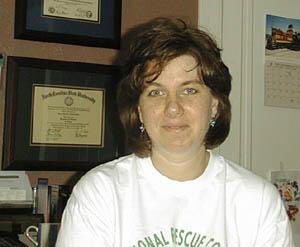Lynn Amowitz
After years of offering medical help to refugees, Lynn Amowitz decided she needed to solve the problems at their source: the human rights violations driving refugees from their homes. Arnowitz was deeply influenced by antisemitism she faced in the small North Carolina community where she grew up, as well as her grandparents’ stories of their suffering in Eastern Europe. She began her career in medicine and public health offering humanitarian aid to refugees in Rwanda and Zaire. But after a trip to Albania, Amowitz realized that providing aid to refugees did not fix the underlying reasons for the refugee problem. She joined Physicians for Human Rights as a Fireman Fellow in Health and Human Rights, investigating human rights issues and violence against women in Kosovo, Afghanistan, Iraq, Nigeria, and Sierra Leone. Refusing to choose between her work and her family, Amowitz brought her still-nursing daughter with her to Afghanistan, pointing out that the refugees she worked with lived under far harsher conditions. She continues her efforts to investigate human rights violations around the world.
Amowitz describes her childhood in Greenville, North Carolina, including the antisemtisim she faced from classmates; despite this, she continued to be open about her Jewish identity. When she was eleven years old, her parents started a synagogue in the area so she could be bat mitzvahed. The stories of the oppression her grandparents faced in Russia, learning about the Holocaust, and her own experiences with discrimination influenced her decision to become an advocacy worker. Still, she was unsure how to do it. While working toward her public health degree, she attended lectures concerning the Cambodian Thai refugee camps, and she realized that she wanted to work in the human rights field. After she graduated from medical school, she spent twelve weeks in Africa, just as the Rwandan crisis was breaking out. She returned a month later and witnessed the violence and destruction there. This experience concretized her desire to advocate for access to health care in war-torn countries. Upon returning to the United States, Amowitz tried to find the best way to help, eventually speaking to the Harvard School of Public Health ex-dean, who put her in touch with Physicians for Human Rights. They hired her to do their human rights investigations. Amowitz conducted population-based studies on human rights violations perpetrated by the Taliban against women. She also studied the prevalence of sexual violence in Sierra Leone and taught human rights courses to medical students in Kosovo. Amowitz recognized that her work often subverted her expectations as a mother but noted that most of her family and friends have adjusted to her career. Amowitz's biggest challenge was placing her experiential knowledge of human rights into an academic framework. She believes her most significant impact lay in creating a path to working as an activist for new medical students/residents. Amowtiz hopes that her work would eventually help mold policies and improve the methodology of her field.



